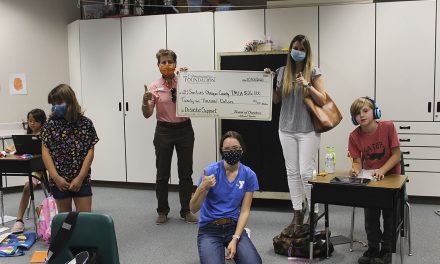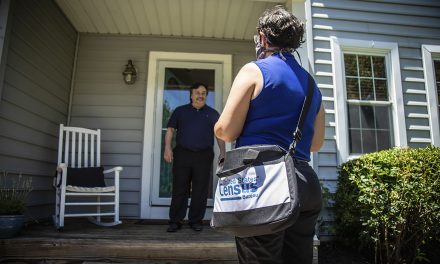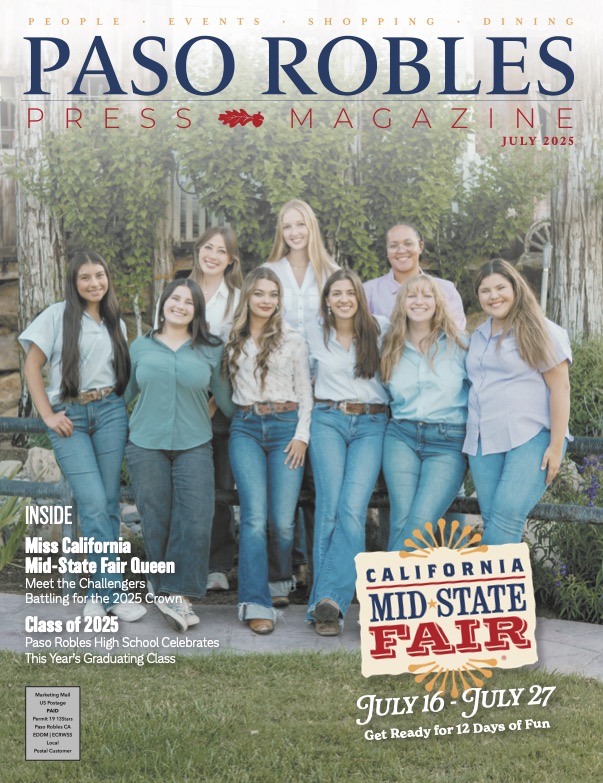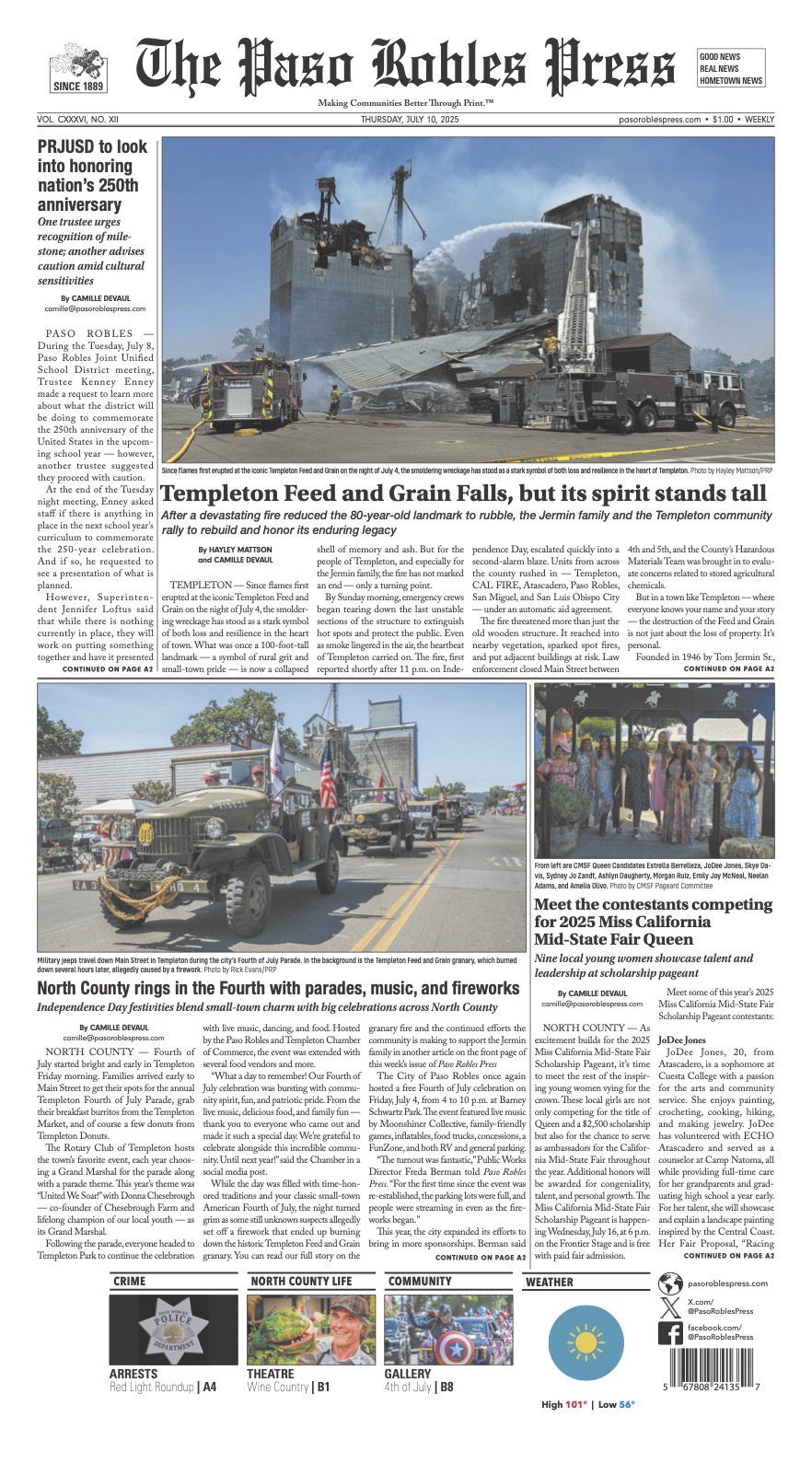County Health Director Dr. Penny Borenstein gives update on COVID-19 effects for county
By Michael Chaldu
SAN LUIS OBISPO COUNTY — The San Luis Obispo County Board of Supervisors met for their regularly scheduled meeting on Tuesday, Jan. 25. This meeting was a virtual meeting scheduled due to rising COVID-19 cases in the county.
In fact, the first item of the meeting was the added Item 25, a resolution to have the supervisor’s meetings held remotely (via Zoom) for the next 30 days because of the COVID-19 spike. The resolution passed by a 5-0 vote.
That vote was followed by an update from Dr. Penny Borenstein, County Health Officer, and Public Health Director, on COVID-19 in San Luis Obispo County.
“We have continued to see a surge that continues to break all-time records in San Luis Obispo County,” Borenstein said as she began to recite county numbers from just the past two weeks.
She reported that COVID-19 cases are up to 43,234 in the county, which represents a 21 percent increase from the total given just two weeks ago, and the increase represents 17 percent of the cases reported over the past two years. Borenstein also said that there had been 4,400 cases reported this week, which is more than the last two months combined. Finally, Borenstein said there were five deaths reported Tuesday, bringing to an all-time total of 389 county residents since March of 2020.
“If anyone thinks we are not in the middle of a pandemic with these kinds of numbers, it really remarkable what we are seeing,” she said.
Borenstein said COVID-19 testing sites are over capacity, and people without an appointment are being turned away, with contact tracing only being done for high-risk patients. She advised those with mild symptoms to avoid going to the emergency room. She also said vaccination continues to be effective against Omicron, and mask requirements are still on in the county and the state. Finally, while Borenstein states it is likely in the coming weeks, the county numbers will start to go down, she recommends to avoid large gatherings, wearing masks, and keeping shots up to date.
Next, the board passed the Consent Agenda (Items 2-17) with a 5-0 vote.
Item number 8, the county library’s decision to opt-out of the Black/Gold Cooperative System shared with other Central Coast libraries, was the subject of some discussion before the agenda was passed.
One public caller objected to the move away from Black/Gold and District 3 Supervisor Dawn Ortiz-Legg said she has also received substantial public comment about the action, which she conveyed to SLO County Library Director Christopher Barnickle; however, Barnickle said the move was necessary to focus the libraries’ services and resources on the county’s citizens.
Next up was Item 20 a presentation from Steve Rice and Brian Buckley of San Luis Obispo Defenders. This firm serves as the primary public defender for San Luis Obispo County. It was the first time the two came before the board since the firm began to serve the county. Rice outlined the reach of the firm, which staffs courts in SLO, Paso Robles, and the juvenile court, and highlighted the firm’s collaborative work with Superior Court, the District Attorney, Probation Department, law enforcement, and the community at large.
Next, Buckley talked about the numbers of cases the firm has worked on since July and listed the challenges in completing cases, chief among them the COVID-19 pandemic, trial bottlenecks, and low juror turnout. However, Buckley did look forward to a future project with District Attorney Dan Dow to hold expungement clinics to help people clear their criminal records and get jobs.
Next, Item 21, was the Mental Health Services Act Annual Update. Anne Robin, Behavioral Health director, introduced Frank Warren, prevention and early intervention division manager and MHSA coordinator, who led the presentation. Warren explained the process of the annual update and then reported on the financial information for the department. Warren also told the board of programs such as their Middle School Comprehensive Program, which uses prevention and early intervention (PEI) programs to help risk populations. After the presentation, the update was approved by a 5-0 vote.
The board then heard Item 22, which was a contract for a new skate park at Nipomo Community Park, which was awarded to J.J. Fisher Construction for $2,640,863. The contract was approved by a 5-0 vote. Before the vote, Nick Franco of Parks and Recreation talked about the park, which was designed by the community through public workshops, and is the next project of the Nipomo Community Park Master Plan.
After the board adjourned for closed session and recess, it reconvened in the afternoon to hear Item 19, which was the approval of the county’s 2022 State Legislative Platform. The item was moved from the morning session. Karen Lange and Paul Yoder came on to update on how legislation was going in Sacramento.
Lange told how legislation is being introduced until the end of February, after which time they will send emails to flag bills of interest to the county. Lange also mentioned the release of the state budget with revenues that are outperforming expectations and looks “rosy” in the short term and the Governor’s emphasis on housing and homelessness.
A bone of contention in the board’s effort to approve the platform came when District 1 Supervisor John Peschong introduced a motion to add a resolution stating the county’s opposition to three state bills: AB1400, the “Single-Payer” health bill; SB866, which would allow a minor 12 years old or over to get a vaccination without parents’ consent; and SB871, which would repeal the personal beliefs exemption from vaccination. The motion was seconded by District 5 Supervisor Debbie Arnold. The motion, however, was opposed by District 2 Supervisor Bruce Gibson, who expressed reservations about weighing in on state bills “we don’t have in front of us.” However, after some discussion, the motion would pass by a 3-2 vote, with Gibson and Ortiz-Legg opposing.
The last item of the day, Item 24, involved identifying priority projects for the Department of Planning and Building. Trevor Keith and Airlin Singewald of the Planning and Building Department made a presentation listing the available projects for the supervisors to review.
After the presentation, the board’s consideration for priorities was concentrated mainly on three of four projects listed under “Ordinance Revisions/Clean-up”: Craft Distilleries Ordinance, Guest Ranch to Dude Ranch Amendment, and Urban Small Wineries; and the Rural Camping Ordinance. Peschong was the first to suggest the Rural Camping Ordinance as a priority, which got support from Arnold and Compton (with some concerns), as well as several people speaking in public comment. Ortiz-Legg suggested grouping the camping ordinance with the Guest Ranch to Dude Ranch ordinance along with craft distilleries. Gibson, however, was resistant to adding the rural camping ordinance because he didn’t think it was a priority and it took up too many FTEs; he suggested instead prioritizing the Ordinance Revisions/Clean-up and heading back to the rural camping ordinance on a later date. Peschong, saying the camping ordinance had great support in his district, insisted on including it and grouping it with craft distilleries and urban small wineries. After a few failed attempts to pass the motion, Compton re-introduced that combination for approval, and it was voted in by a 3-2 vote, with Gibson, and Ortiz-Legg opposed.
The next Board of Supervisors meeting will be held Tuesday, Feb. 1, at 9 a.m. It will be a remote meeting via Zoom. For the Feb. 1 agenda and video and audio of the Jan. 25 meeting, visit their website here.
















